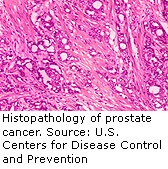
WEDNESDAY, March 10 (HealthDay News) — Though hormone therapy has proven useful in treating late-stage prostate cancer, it often results in the development of fatal secondary tumors that are resistant to such therapy.
Now, however, researchers working with mice believe they have uncovered a mechanism by which the secondary tumors gain their resistance — a finding that eventually might help prolong the lives of men with prostate cancer.
Substances secreted during the body’s inflammatory response to the hormone therapy appear to play a role in creating resistance to hormone therapy, according to the study, published in the March 11 issue of Nature.
Doctors might be able to delay the onset of hormone-resistant tumors by two to three years if subsequent research finds a way to control the effects of inflammation, according to the research team, which included scientists from the University of California, San Diego (UCSD), the Scripps Research Institute in Florida and the Engelhardt Institute of Molecular Biology in Moscow.
Hormone therapy for prostate cancer, also known as androgen deprivation therapy or androgen ablation therapy, involves the reduction of male hormones in the body, according to the American Cancer Society. These male hormones, called androgens, promote the growth of prostate cancer cells. Reducing androgen levels can cause prostate tumors to shrink or can retard their growth, making them easier to remove surgically or treat with radiation.
“That therapy usually works, but in too many patients it leads to the appearance of castration-resistant cancer — cancer that no longer responds to androgen ablation therapy,” said Michael Karin, one of the UCSD researchers. “That form of prostate cancer is more aggressive, more metastatic and more difficult to treat with traditional chemotherapy and radiation therapy.”
By studying prostate cancer in mice, the researchers figured out that, as the prostate tumor shrinks, the dying cancer cells apparently send off signals that activate the body’s immune response.
“What we think is going on is, when you kill the tumor, the body doesn’t know it’s the tumor being killed,” Karin said. “It responds to it like there is tissue injury, a wound or something like that.”
White blood cells called B-cells infiltrate the tumor and release a substance called lymphotoxin, a protein that kills infected cells. The research team found that exposure to lymphotoxin promoted the development of cancer cells resistant to hormone therapy. Interfering with the inflammatory response delayed the development of castration-resistant cancer.
“It’s somewhat counterintuitive, that the death of these androgen-resistant cells somehow contributes to androgen resistance,” said Dr. Durado Brooks, director of prostate and colorectal cancer for the American Cancer Society.
The finding could be key in developing a means to delay or stop the development of therapy-resistant secondary tumors. Until now, research into this resistance has focused on the role that the cells’ androgen receptors play in the process. But researchers now can also consider controlling inflammation as another way to delay resistance.
Don’t expect anything useful for humans anytime soon. Researchers will have to first make sure that human prostate cancer responds in the same way that the cancer did in mice.
“There’s going to have to be a lot more work done to clarify that the mechanisms in humans are the same as those they have identified in mouse prostate cancer,” Brooks said. “It’s going to be quite a while before this mouse model moves to the bedside and actual clinical practice, if it ever does.”
But if the findings do transfer to humans, this new understanding of the role of inflammation in prostate cancer treatment could help extend lives.
“Androgen resistance is often one of the complications that occurs in later stages of prostate cancer management that often precedes death related to prostate cancer,” Brooks said. “If there was a way to prolong the time between treatment and development of androgen resistance, we could prolong a man’s life.”
More information
The U.S. National Cancer Institute has more on prostate cancer.

